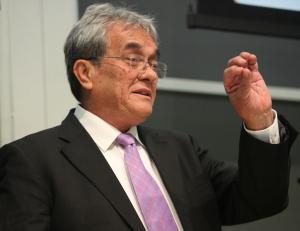U.N. Climate Negotiations: Perspectives from Small Island Nation
New York, February 20, 2013—The Republic of the Marshall Islands should be a warning of the potential catastrophic consequences of climate change, said the Hon. Tony A. deBrum, a senior Minister in Assistance to the President of the Marshall Islands, at a recent discussion organized by Columbia Law School's Center for Climate Change Law.
The Republic of the Marshall Islands has taken a lead role in seeking reductions in worldwide emissions to help curb climate change. For a country that could be submerged if sea levels continue to rise, the threat is one they can’t ignore.
| Hon. Tony A. deBrum |
"I think that our struggle here is that we want to remain alive for the rest of the century, not only as a people but as a country,” deBrum said. "We have taken it upon ourselves because we believe if we don’t do it no one else will.”
deBrum said the effects of climate change could render the Marshall Islands totally uninhabitable, drawing a comparison between the current climate threat and the atomic testing that the United States conducted on the Islands from 1946 through to 1958.
The Marshallese will be displaced if the sea overtakes their land, yet there is no legal obligation for any other country to take in people who are forced to migrate as a result of climate change. But even if the relatively few inhabitants of the Marshall Islands could find a place to relocate, deBrum emphasized that is not something the population wants to consider.
Through negotiations at the United Nations and other diplomatic forums deBrum hopes to influence climate policy globally, but he also described steps the people of the Marshall Islands have taken to do their part. For example, many households in the outlying areas of the Islands will be equipped with solar panels by September of this year.
“Unless the world responds to all of the information that has been provided and documented to date on the issue of climate change, we will have a disaster that hasn’t been experienced in this world before,” deBrum said. “This world must stop or write its own obituary.”
| Michael B. Gerrard |
Michael B. Gerrard, the Andrew Sabin Professor of Professional Practice at Columbia Law School and director of the Center for Climate Change Law, who moderated the event, said:
“The possible submersion of the Marshalls and other low-lying island nations is a foretaste of what could face many highly populated coastal areas if the world stays on its current trajectory of rapidly increasing greenhouse gas emissions.”
The discussion was introduced by Judge Jack B. Weinstein ’48 of the U.S. District Court for the Eastern District of New York, and Dr. Radley Horton of the Center for Climate Systems Research at The Earth Institute Columbia University, provided background on the science behind climate change and rising sea levels. The Earth Institute co-sponsored the event.
The Center for Climate Change Law will host another panel discussion on March 28 from 7 p.m. to 9 p.m. That event, “Legal Issues in Managed Coastal Retreat” will cover legal questions related to rebuilding areas affected by Hurricane Sandy.

